How to write your own eulogy
I’ve covered my own vasectomy, a ride in an F1 car (don’t, just don’t) and running with the bulls in Pamplona, but none of that even comes close to this.
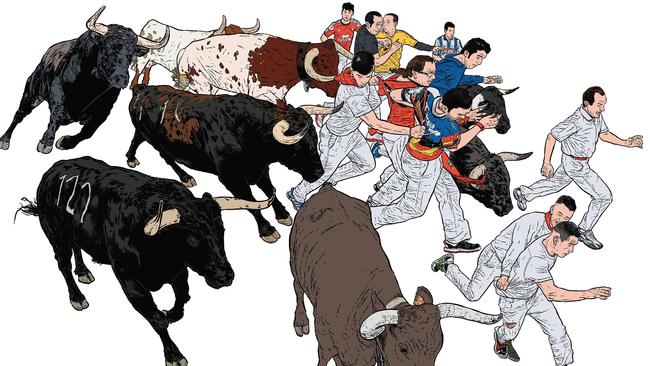
The only existing copy of the most excruciating piece of writing I’ve ever been forced to exude lies lightly on my father’s remains, six feet under a brutal, ugly, rock-strewn thatch of bone yard on the high plains of NSW; a place as cold as death itself. I should have kept a copy of that eulogy – bashed out between gulping sobs and bourbon slurps on the other side of the world – and perhaps I did, on some now long-lost laptop, but even now, 26 years later, I couldn’t bear to read it.
Unfortunately, it’s not the only eulogy I’ve been empanelled to produce. As “the writer” in my extended family, I was asked to encapsulate the lives of my grandparents – despite pointing out that there were surely people who’d known them decades longer than I had – and an aunt. Sure, being the eulogist is not as bad as being the only proctologist in a family, but trust me, it’s not great.
Strangely, though, it’s the eulogies I’ve not written that I’ve found the hardest to endure. To attend a funeral where the priest stands up and, despite clearly not knowing the deceased from Adam (who it’s unlikely he personally ever encountered either), attempt to colourise the dark grey day of their interment is to see a life disrespected and unforgivably unheralded. Which is at least partly why I was gripped, and challenged, by my recent revelation that it is possible, and possibly even wise, to write your own eulogy.
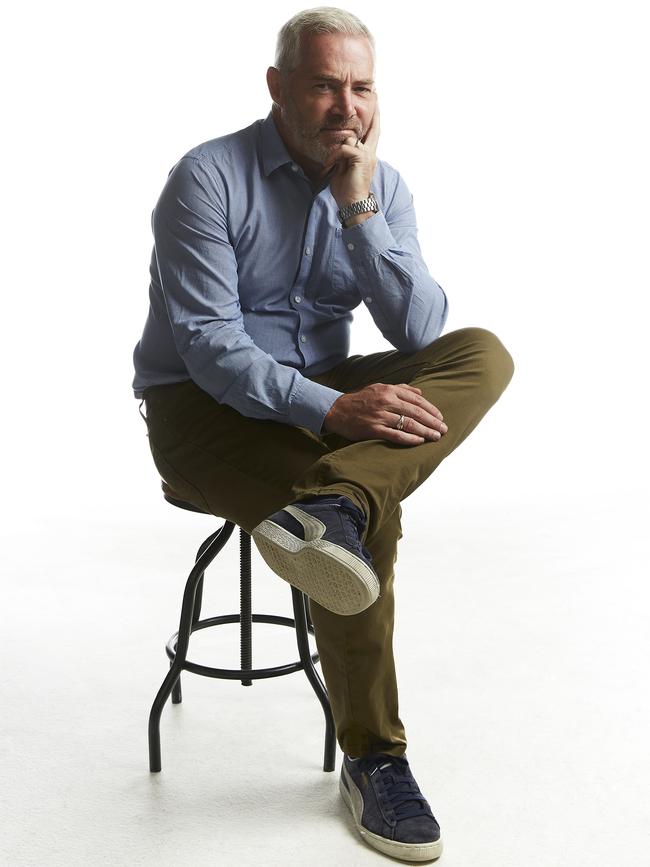
Funeral director Kelly Scott encourages people to do exactly that as part of “funeral pre-planning” (as someone who finds it hard to plan what I’m going to do tomorrow, I found the existence of this term revelatory enough). Scott, general manager of TJ Scott & Son in regional Victoria, is driven partly by her belief that doing so is a generous act for those you leave behind, and lifts an enormous weight from them at a difficult time, but also by how many awful eulogies she’s heard. “It’s a real topic of discussion at funerals, and people do get disgruntled. You’ll hear them say afterwards, ‘Well, that wasn’t the Bill I knew at all’,” she says.
“Eulogies have become far more common over the past 10 years. Back in the day, in your more religious funerals, there wasn’t space for them because it wasn’t part of the liturgy, so the family wouldn’t speak. But now, when you do get a good one, the experience can be so much richer, and you’ll see people come out laughing, as well as crying, because they come out thinking ‘Well, that was a beautiful life’. If you could write your own eulogy, it would be an absolute gift to leave that to people, so they don’t have to worry.”
I’m pretty sure my dad’s eulogy had some jokes in it – I find it hard to write anything from out-of-office emails to shopping lists without them – but because I was stuck overseas and couldn’t be at the funeral to deliver it, I’m not sure how they landed.
Dale Maroney, a fifth-generation funeral director at Walter Carter Funerals in Sydney, is another big fan of people pre-planning their funerals and says if it was up to her, everyone would write their own eulogies. (I tried to point out that this would lead to state funerals for politicians going for days, but she still insisted.)
–
“When you hear a good one, the experience is richer … people come out laughing as well as crying”
–
Maroney says she’s seen pre-prepared eulogies through her work just a few times, and one of them was her own mother, Marjorie. “As she got older, I thought, ‘She’s had an interesting life’, so I sat her down in front of a camera and we recorded this amazing video of her telling her own story … when she did eventually die, we played it at her funeral, and it was lovely, people clapped and we gave out copies,” she explains. “I would love for more people to do it. I get some people who are positive about the idea but keep saying, ‘One day, I’ll do it’. But of course, it often ends up too late.”
Well, not for me it won’t, I thought, as I committed myself to the task, before smacking straight into a wall of writer’s block as thick as a pharaoh’s tomb. Obviously, I would want my funeral to be equally filled with people ululating in agony and crying rivers of laughter, but how does one find the right tone? I was equally inspired by the epitaphs of Spike Milligan (“I told you I was ill”) and Kathy Lette’s proposed one (“Finally, a good plot”), and yet I know I’m not as clever as either.

In terms of legendary eulogies it’s hard to go past the fictional tear-jerker in Four Weddings and a Funeral, which brought the words of WH Auden to an entire generation:
The stars are not wanted now; put out every one,
Pack up the moon and dismantle the sun,
Pour away the ocean and sweep up the wood;
For nothing now can ever come to any good.
I must admit, it feels suitably powerful for a loss as colossal as mine, yet I’m also a fan of John Cleese’s sendoff for his Python colleague Graham Chapman, in which he compared him to a dead parrot, suggested that he hoped he would fry in hell and then threatened to fill the memorial service with “trousers dropping, blasphemers on pogo sticks, spectacular displays of high-speed farting” and other japes one can no longer mention in print.
I eventually decided that discussing my industry-defining side career as a motoring writer might be a good place to start: “Stephen was a Colossus of Roads, a driver so daring and dashing that police officers would often turn on their jaunty, spinning lights and chase him, just so they could hold his licence in their hands and marvel at its existence.”
But it wasn’t, and I soon got stuck in a very writerly rabbit hole over the choice of the third-person or first-person voice. Would I be speaking directly from beyond the grave – “I will miss you all, unlike the assassin that finally got me” – or was that too Walking Dead? Or would describing myself in the third person make me sound too much like a modern sporting hero, or Michael Clarke?
Fortunately there are websites that offer helpful hints on writing your own eulogy, and indeed treat doing so as a kind of emotional tool – an endoscopy for the soul. A beaming, beatific bloke named Matt Valentine, who blogs about spiritual matters, advised that Step 1 was to imagine my own death, and my funeral, warning that I would find this “pretty intense”. Actually, I found it confusing rather than helpful as I couldn’t work out how I’d left such a beautiful corpse, nor why Margot Robbie was draped over my coffin, weeping, while Barack Obama and Mark Hamill seemed to be fighting over who would get to be the celebrant.
Step 2 was “ the writing part” and I was advised that I would need at least an hour for this. Considering the fact that I’d decided an appropriate length for my eulogy was between four and five hours, I really didn’t think this was long enough, nor was it particularly prescriptive, or helpful.
Another site, thestorytelleragency.com, piqued my interest by suggesting I consider the eulogy as “a Final Gift to Those You Loved (Or Hated)”. Now, I know that those I love are sick to death of me talking about myself already, so leaving a final spray to those I hated seemed far more appropriate. But then I realised there would be very few cyclists, reality-TV contestants, people who drive slowly in the fast lane or South African rugby players at my funeral. This site also advised that even if writing my eulogy might “seem odd or even scary, you shouldn’t let fear win”. I wasn’t finding it scary, however, just impossible, so I thought it was time to turn to an actual expert.
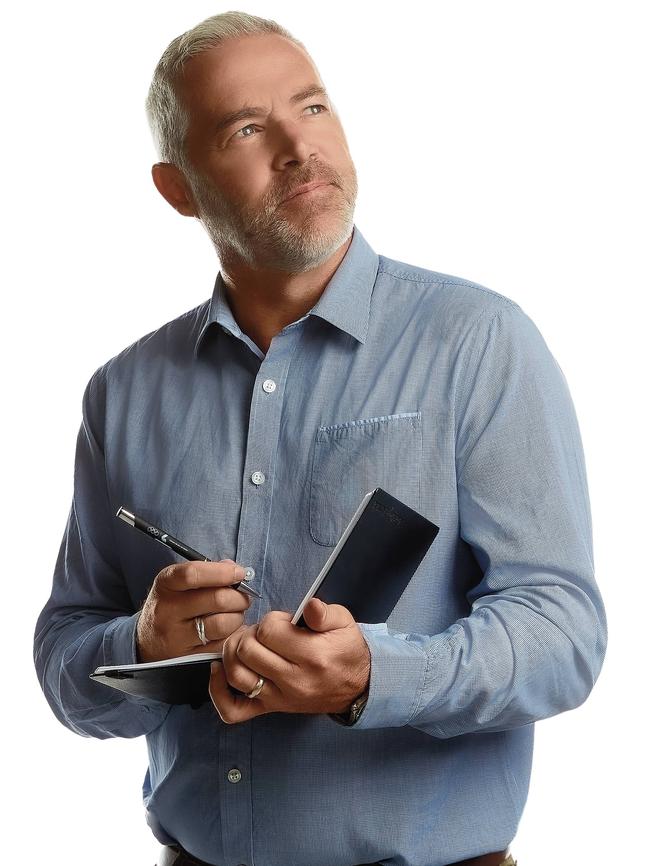
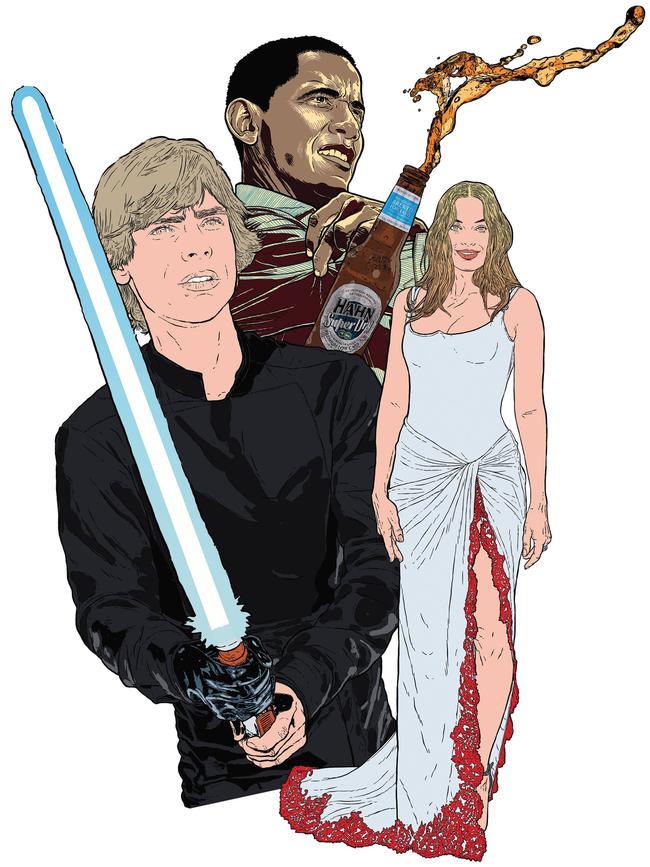
Professor Lauren Breen, from Curtin University in Perth, is a psychologist who specialises in the fields of grief and loss and introduced me to new terms like “Death Positivity” and “Grief Literacy”, which are, apparently, movements aimed at getting people to discuss things like what will happen when they’re gone, before it’s too late.
Professor Breen wholeheartedly agrees that writing your own eulogy would be a good idea, but recognises that it’s a huge mental leap for most people. “Generally, the way we think is, ‘Everyone else is going to die but not me’, when of course one of the only certainties we have is that we’re all going to die, we just don’t like to talk about it,” she explained, as I squirmed uncomfortably. “We make an appointment every year for that other certainty, our taxes, but wouldn’t it be great if we had an appointment to talk about death and review our lives every year? If you have the opportunity to have those conversations about your eulogy beforehand, that would be fantastic, because it doesn’t have to be negative, it’s about celebrating your life. It’s about your legacy.”
This all sounded positive enough, except that the legacy I’ve always wanted to leave is writing one of the great novels of our time, but I haven’t done it yet, which would mean focusing on failure in my eulogy, which would be a downer, so I should just put it off. Or perhaps I’m just doing exactly what the professor suggests and running scared from the act of tempting fate.
Professor Breen did also advise me to be cognisant of the risks of what I was ineptly attempting. “It promotes life re-evaluation and that can activate a difficult review process; the risk of writing a eulogy is that it might highlight those regrets or missed opportunities, or events that are painful or traumatic,” she says. “There’s also the danger that we might include things in a eulogy that might be perceived as hurtful. We might emphasise one adult child’s achievements over another, or someone might mention their first wife more than the current one. There might be no intention to cause harm, but harm might still occur.”
Frankly, I’ve never worried too much about offending people with my writing while I’m alive, so the thought of getting noses out of joint once I’m no longer able to hear the complaints or read the online comments didn’t bother me for long.
It soon struck me, however, that I had merely come up with a long list of things I didn’t want to say in my eulogy, and a vanishingly small one of things I could or should include. It’s hard to express how annoyed at myself I am about this, because normally I love writing about things that are even scarier than death. I’ve covered my own vasectomy, jumping out of planes, taking a ride in a two-seat F1 car (don’t, just don’t) and running with the bulls in Pamplona, all of which I did for work.
–
“I imagined my funeral … and I couldn’t work out how I’d left such a beautiful corpse”
–
The problem, I fear, is not just that thinking about your own death is dark and depressing and that the task of trying to come up with the last words that your beloved children will ever hear from you is as daunting as naked public speaking. No, the biggest issue is that writing your own eulogy feels like bragging, which seems like an unforgivable sin, particularly for someone who might be floating around in purgatory at the time it’s given.
So, here’s where I’m at, after my best efforts, and significantly more than an hour of trying:
“Stephen loved words, and writing them, but hated writing eulogies. He wishes he was here to tell you a few jokes, to cheer you all up, but he felt that it would be more appropriate if you stayed stricken with grief, because his loss must be a terrible blow to you all, and to the world in general.
“To my darling wife, I’m very sorry about the Margot Robbie thing. And to my children, who I love more than sunlight, more than skiing, travel, chocolate, cold beer on a hot day, more than reading, writing or laughing, or hugs or, indeed, life itself, you made it all worthwhile, and I never did, or made, anything within a zillion quarks of being as magical as you.
“I hope you both live as long as my 110 years, and I surely hope that you appreciate not having to write this eulogy.
“I love you. So much. Good night.”
Well, writing that made me sniffle a little, so I’m calling it a success. Now go and try it yourself, dear reader, it’s even harder than it looks.


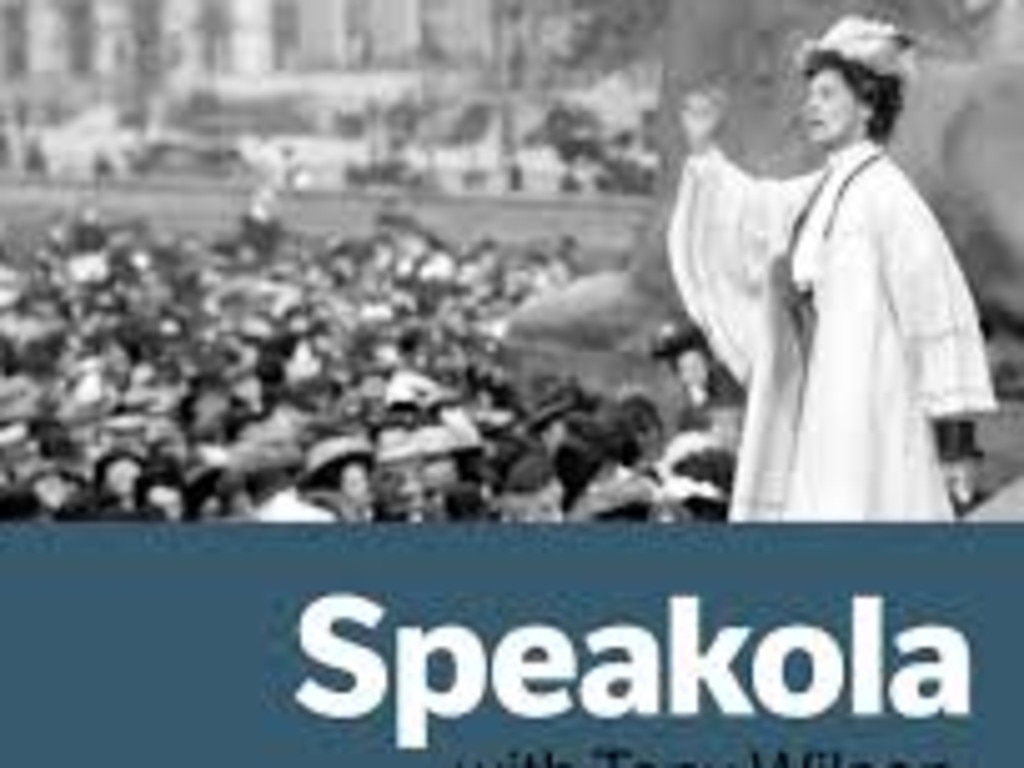

To join the conversation, please log in. Don't have an account? Register
Join the conversation, you are commenting as Logout